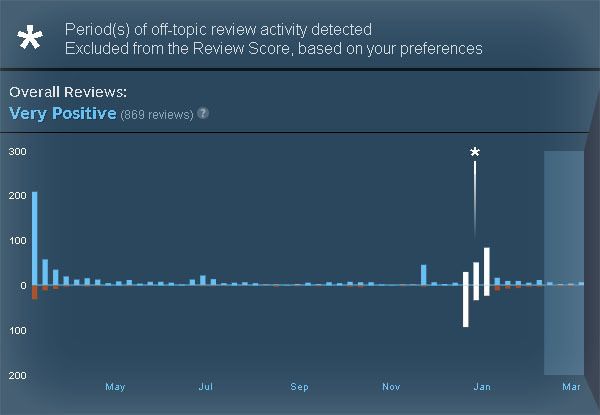Valve is taking a hands-off approach to review bombing with their latest update, and not everyone is happy about it.
Steam has a problem with review bombing. On the one hand, developers hate it since user review scores are incredibly important and negative reviews can really affect a game’s sales. On the other hand, gamers see it as one of the few ways they can really let their voices be heard on such topics as digital rights management, excessive microtransactions, or poor developer support.
In the end, Valve sided with the developers. In their March 15th blog update, Valve announced the implementation of a new system designed to curtail review bombs from affecting a game’s review score.
Here’s how it works. First, Steam now has a tool that detects when a review bomb is occurring. The tool knows that most reviews occur within the first few weeks of release, and if months after the fact there is a sudden burst of negative reviews, the system notifies a team at Valve who then verifies that a review bomb has occurred.
Once verified, the team then gets to work identifying when the review bomb started and when it ended. Then, the team removes all of those reviews from the overall user review rating. The reviews still stay in the “reviews” section of the game’s store page, but they don’t contribute to the overall user score. Valve then leaves it to the developer to sort through the reviews in this time period and decide whether they want to keep or throw away each individual review.
RELATED: DWARF FORTRESS CREATORS CITE HEALTHCARE COSTS AS THE REASON BEHIND UPCOMING STEAM RELEASE
On the upside, now review bombs won't affect a game’s user review score and tank its sales. On the downside, any legit reviews submitted during the review bomb are lost and also don’t affect the user review score.
Worse still is it removes one of the few tools gamers had available to combat predatory business practices in the games industry. Review bombs were a way for gamers to plant a giant red flag on a game to warn off other gamers from a developer gone bad.
Take Abstracticism--weeks after the game’s launch, users noticed that it installed a cryptocurrency mining trojan on their systems that would continue operating even after the game was shut down. An organized review bomb was the first notification Steam had to the game’s nefarious purpose and eventually got it shut down.
Steam’s new review bomb rules have been praised by developers, but panned by gamers. Now, gamers must be extra vigilant to research a game before they click that purchase button.
NEXT: HYPER LIGHT DRIFTER DEV'S NEXT GAME REVEALED, COMING TO EPIC STORE INSTEAD OF STEAM


